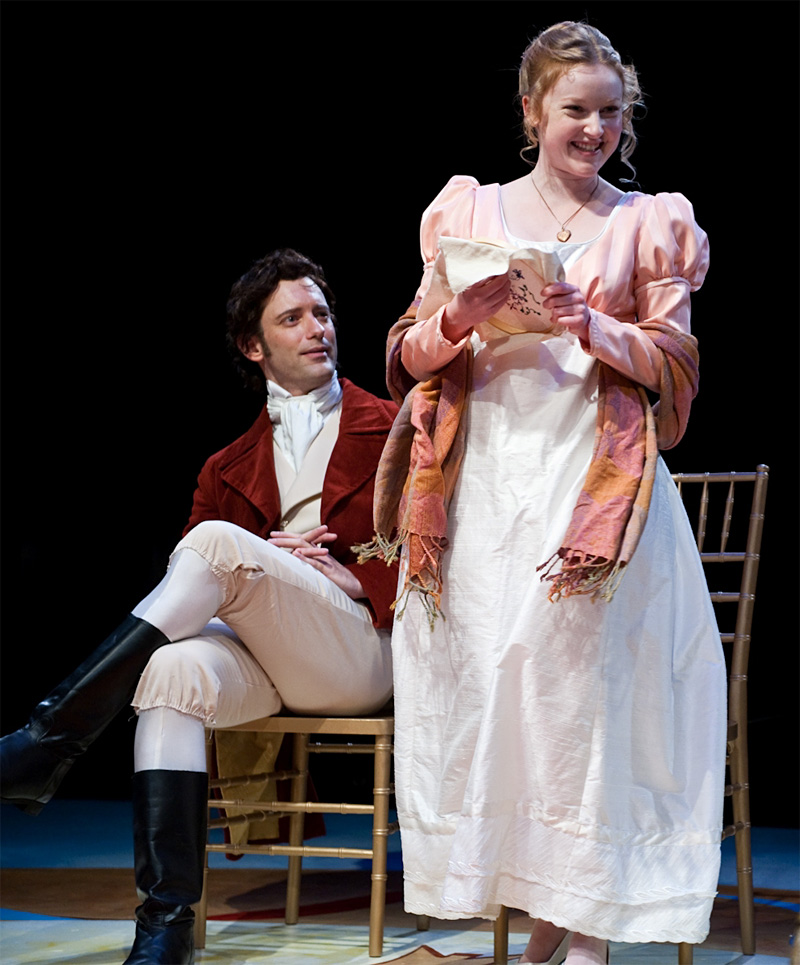Revealing perhaps more about herself than about her creation, Jane Austen described the heroine of her novel Emma as a character “whom no-one but myself will much like.” It’s Emma Woodhouse’s difficult aspects, primarily her “disposition to think a little too well of herself,” that actress Sylvie Davidson seems a bit hesitant to explore in Book-It Repertory Theatre’s staging of Rachel Atkins’ rich and artful adaptation. (Marcus Goodwin directs.) Emma’s boundless self-confidence leads her to treat everyone’s social lives as chess pieces in a grand game, and Austen makes comedy out of her chronic meddling. (Not for nothing did Amy Heckerling choose the title Clueless for her 1995 film mutation of Emma.) But Austen also creates genuine pathos, particularly when Emma’s pet project Harriet is heartlessly steered away from the man whom everyone but Emma can see is ideal for her. As adept as the sparkling Davidson is in the role (a long one; she’s barely ever offstage), Emma’s manipulation of Harriet (Ashley Marshall) isn’t as troubling and moving as it should be; Davidson hesitates to reveal the smugness and imperiousness behind Emma’s maneuvers. Only later, when Emma’s game-playing turns around to bite her in the bustled butt, does Davidson show how wrenching and mortifying this moral awakening is for her.
The men in the cast are perfect. It’s been observed that nowhere in any of her novels did Austen ever write a conversation solely among men, so closely did she identify with her female characters, which makes her men trickier to channel and these actors’ achievements so impressive. First among them is Dylan Chalfy as Mr. Knightley, family friend to the Woodhouses—impeccable in behavior, sober in judgment, the moral counterweight to Emma (and to several other even less self-aware characters). It’s a heavy burden on the page, but Chalfy creates a full human being out of Austen’s few, elusive clues. Knightley becomes a charming role model, upright but never colorless, and only enough of a prig to provide a little comic shading. It’s just about the most convincing realization of an Austen hero I’ve seen on stage or screen.
Another issue Austen adaptations have to deal with is how broad to make the comedy—how far to take Austen’s unsparing satire of characters whom no one, including herself, will much like. Not stinting on funny voices and sight gags, Book-It takes it pretty far, but makes it work because the cast seems not to exaggerate these characters, but to distill them into a more concentrated and flavorful form—especially Emily Grogan as the vulgar snob Mrs. Elton, into whom Austen seemed to pour every unpleasant trait from every woman she ever disliked. Two centuries before The Office, Austen exploited the comedy of discomfort; we wince and avert our eyes every time Mrs. Elton opens her mouth, but laugh anyway.
With practically no set, a handful of chairs is all this skillful ensemble needs to conjure the early-19th-century English settings, from the claustrophobic intimacy of a coach to outdoor strolls and gatherings. Laura Ferri’s choreography for the ball scenes is not only beautiful, and beautifully realized, but helps us understand just why social dancing was so important in Austen’s world: The figures are just intricate enough to make proper execution a noteworthy accomplishment, conferring status, but not so intricate the dancers can’t chat, flirt, and gossip.







